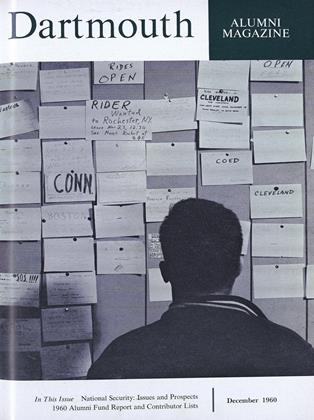IN the quiet setting of Hanover, without fanfare and publicity, ten distinguished Soviet scholars, writers, artists and administrators met for a full week of discussions with a similar group of prominent Americans, from October 28 to November 4.
During the past few years, under agreements between Washington and Moscow, there has been a considerable exchange of such groups, and the meeting at Dartmouth was held as part of this exchange program. The College simply provided facilities for the conference, the plans for which were worked out in consultation with the State Department; and the Ford Foundation supported the American participation and the costs of the meeting, just as it has supported exchanges of scholars in the past.
The meetings were held in Sanborn English House and the delegates were housed at the Hanover Inn. Discussions were private and no news stories were written, but a joint statement released in New York a few days after the Russian delegation left Hanover said that the conferees had "concluded that unofficial gatherings can contribute substantially to mutual understanding and decided to organize a similar meeting on U. S.-Soviet relations in the near future in the hope of broadening the discussion fruitfully and achieving a more profound mutual understanding."
The talks in Hanover dealt with five broad areas: the roles of the United States and the USSR in the economic development of emerging nations, the psychological foundations of peace, arms control, the creation of a structured peace, and the role of the citizen in the development of responsible foreign policy.
The Soviet participants had as their chairman Alexandr Korneichuk, author, playwright, and Deputy of the Supreme Soviet of the USSR. Others in the group were Oleg Bykov, historian; Victor Chkhikvadze, authority on international law; Alexandr Karev, General Secretary of the USSR Council of the Union of Evangelical Christian Baptists; Irina Logunova, professor and radiologist; Vano Muradelli, composer; Boris Polevoi, author and Deputy of the Supreme Soviet of the RSFSR; Zoya Pushkareva, director of an institute of 21,000 students and a Deputy of the Supreme Soviet of the USSR; Modest Rubinstein, economist; and Sergei Yutkevich, cinema director and producer. Alice Bobrysheva was interpreter.
President Dickey was a member of the U. S. planning committee, which included Arthur Larson, director of the World Rule of Law Center, Duke University; Philip Mosely, director of studies, Council on Foreign Relations; Dr. A. William Loos, director of the Church Peace Union; Shepard Stone '29, international affairs program director for the Ford Foundation; and Norman Cousins, editor of Saturday Review.
Other noted Americans who participated in the discussions were George F. Kennan, former U. S. Ambassador to Russia; Stuart Chase, writer on economics, communication, and conserva- tion; William Benton, chairman of the board of Encyclopaedia Brittanica, Inc., and organizer of the Voice of America; Dr. Walt W. Rostow, professor of economic history at M.I.T.; Grenville Clark, lawyer and co-author of World PeaceThrough World Law; Agnes de Mille, choreographer; Col. Richard S. Leghorn, chairman of the National Planning Association's. Committee on Security. Through Arms Control; Russell Crouse, playwright; Dr. Jerome B. Wiesner, director of the Research Laboratory of Electronics at M.I.T.; Dr. George Fischer, professor of history at Brandeis University; and Waldemar Nielsen, associate director of the international affairs program of the Ford Foundation.
In its lead editorial on November 14, The New York Times said:
...Thoughtful persons in all countries are searching for ways to improve the situation and to lessen the tensions which might explode in a thermonuclear holocaust that would destroy us all. In this dark setting a small - but potentially important - gleam of light has now appeared. It is the fact that these past two weeks, first at Dartmouth College and then in this city, a group of distinguished Americans and of distinguished Soviet citizens was able to meet amicably and to discuss vigorously the outstanding issues between our two countries. This group made enough progress toward increased mutual understanding to justify the holding of another such unofficial exchange of views next year, probably in the Soviet Union.
"It is a measure of the straits we are in that a mere civilized discussion of issues dividing our two nations must be counted an appreciable advance. It is another measure of our situation that some will no doubt react with fear and suspicion, wondering if still another group of Americans is not being hoodwinked. We do not share those fears about a group of our fellows including such persons as George Kennan, Philip Mosely, William Benton, Arthur Larson and Walt Rostow. Rather we feel that the Ford Foundation, which financed this meeting, Norman Cousins who arranged it, and President Dickey of Dartmouth who provided facilities are to be congratulated. Their initiative might lead to a new tone and a new atmosphere in Soviet-American relations, and thus help achieve the 'just and lasting peace' to which the Presidentelect referred."
President Dickey with the Soviet delegates as they were about to leave for New York
 View Full Issue
View Full Issue
More From This Issue
-
 Feature
FeatureNATIONAL SECURITY: Issues and Prospects
December 1960 By LOUIS MORTON, -
 Feature
FeatureINSTITUTIONAL PURPOSE in the Undergraduate College
December 1960 -
 Feature
FeatureUNDERWATER TREASURE
December 1960 -
 Feature
FeatureThe Man Behind the Figures
December 1960 -
 Feature
FeatureALUMNI FUND ENDOWMENT FUNDS
December 1960 -
 Feature
FeatureCollege's Annual Outlay Now Totals $12 Million
December 1960







